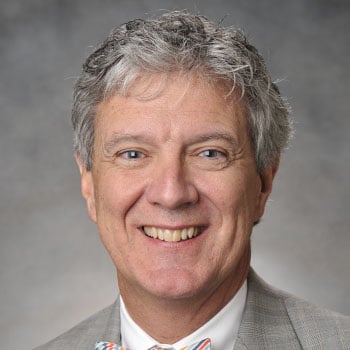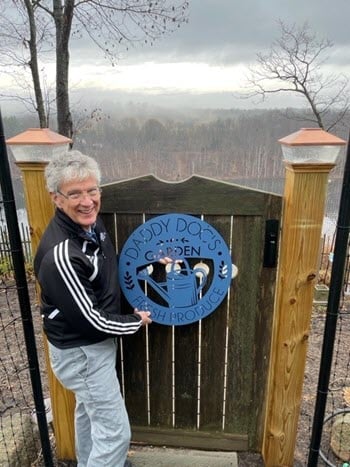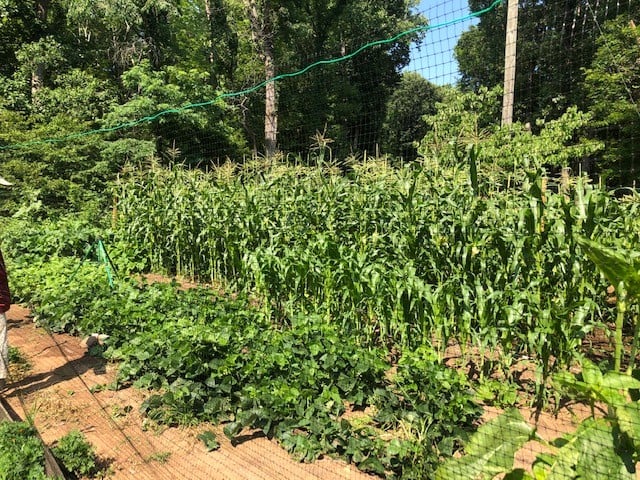February 2022 member spotlight
Thomas W. Eppes Jr., MD
Forest, Virginia
Specialty: Family Medicine
Chair, AMA Integrated Physician Practice Section, 2015–2017
AMA HOD Delegate, Virginia 2009–Present
Board of Directors, Privia Medical Group ̶ Mid-Atlantic
"As a family physician who is still practicing full time, the pandemic has been a curve ball unlike any other that I have experienced in 41 years of practice. The last two years have been the hardest and most stressful ever! Since being a physician is a lifelong profession demanding a never-ending learning curve, there is a call to action for all physicians."
Q: The COVID-19 crisis has magnified and exacerbated inequities in health care, with communities of older people disproportionately affected by the disease. What efforts are needed to coordinate care in Virginia?
A: COVID-19 has spotlighted how illness targets several demographics differently. Anticipating the vaccines were needed to be given quickly to as many as we could with the highest risk categories, our team put together a flow that incorporated volunteers as well as staff. Retired physicians and nurses, along with students of medicine and nursing, were thrown into the mix of our current physicians and staff. Our group gave out 1,000 vaccines over a half day. The model that we created was shared with the local health department. The volunteers for the Health Department and free clinics in Virginia are legally protected from malpractice actions. [This was a result of lobbying years ago by the Medical Society of Virginia.] This led to increasing rapidity of vaccination.
According to guidelines of patients over 65, immunocompromised, obesity, diabetes, and whoever else met the latest criteria were notified via email, web site, calling, and media PSA’s. The limit that we had initially was just getting enough vaccines. Today, we are once again facing the same shortage with the availability of therapeutics.
Q: How can senior physicians help during COVID-19, especially if doctors are retired and want to return to work to work during this time?
A: Retired physicians have a soap box and megaphone to aide our communities. Personally, I have for years worked with local media of a variety of medical topics. COVID has dominated my monthly 20 minutes plus our practice now has a weekly 30-minute program called the “Weekly Dose.” We try to highlight different partners as well as our NP’s and PA’s with a variety of health-related topics. Microphone/camera anxiety is natural to the first timer. However, we just talk as we would to to educate our patients. Retired physicians should be the voices of the “trusted” professional that that have known for years.
The AMA’s daily COVID-19 Update provided by Todd Unger, CXO with the AMA, makes these talking points easy to attain!
Q: What are three lessons you have learned through this pandemic?
- Personally mental health during a pandemic is very important. The cheapest antidepressant is physical exercise/work. When I was in training, a wise doctor taught me to break a big sweat once a week and electronically distance myself.
- I love to watch things grow. It has been 30 years since I have had a garden with more corn, butter beans, string beans, tomatoes, pumpkins, greens, flowers, etc. than I could freeze, consume, or give away. Every weekend in the winter I prepare the soil with compost, cow manure, mulched dead leaves, and a little fertilizer.
- For all retired physicians, staying fit mentally and physically is the key combo. This year I learned the physical marker of cardiovascular fitness. Being able to walk two miles in 30 minutes is the same level of cardiovascular fitness whether or not you are at 20, 40, 60, or 80. This is a goal to shoot for.
Q: As a physician leader, why is physician advocacy important to you? How can physicians have a significant impact outside the practice of medicine?
A: Advocacy is still a role for retired physicians that would benefit our communities and the profession. Those that write the laws and regulations are usually health care under educated. Years of reaching out to your legislator should not stop because you are retired. A physician never stops being a physician.
MD means “many demands.” DO means “demands overflowing.”
Just because one stops seeing patients, does not mean that we stop advocating for the health care issues at the local, state or national level. Years of wisdom needs to be shared and those in power need your wisdom.
Q: Any last advice you would like to provide the Senior Physicians Section members during the pandemic?
A: This pandemic has reinforced certain values such as being a lifelong learner, staying fit, and the joy of relationships with others. The biggest for me has been a deepening spiritual journey. In April 2020, there was a deepening fear of what we might be dealing with, and I had a life changing event. My missionary son was here with three friends who were sharing and praying for specific people. I was called by them and they asked for permission to share and pray over me. . . . Every day since those prayers, I have put my foot in the water knowing I walk with an assurance that what I am doing was called to do by my Lord. There is no greater peace than knowing that.
Contact us
Have information about SPS members doing great work? Email us at [email protected].






